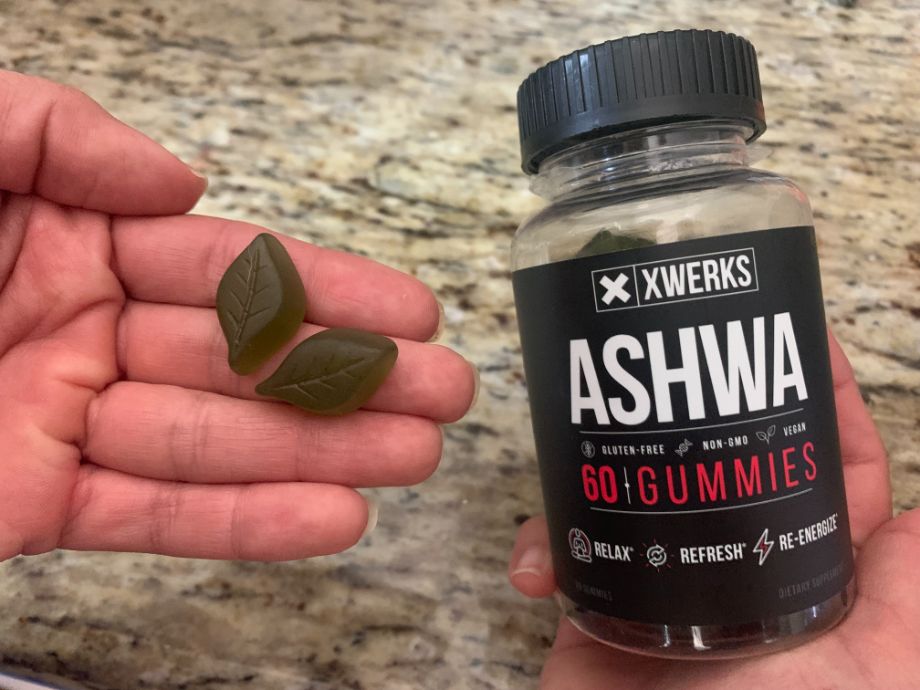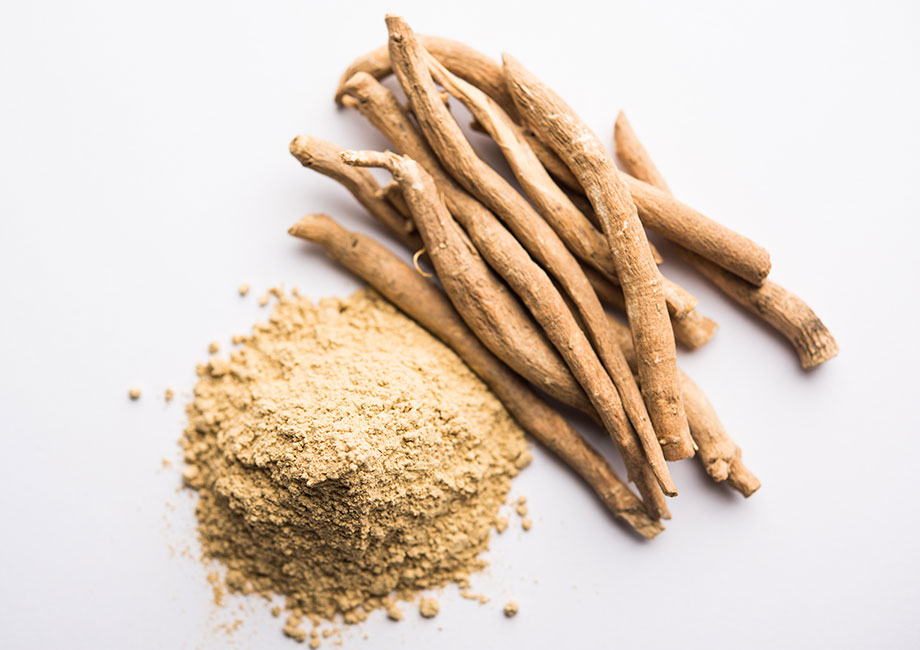We test and review fitness products based on an independent, multi-point methodology. If you use our links to purchase something, we may earn a commission. Read our disclosures.
Ashwagandha is an herb considered to be an adaptogen, which means it may lower stress hormone levels and help maintain balance in the body. It has been used since ancient times in Ayurvedic medicine in India for a variety of health benefits.
RELATED: Exercise and Mental Health
In recent years, people in Western countries have become more interested in using natural remedies like ashwagandha to lower stress and achieve other health outcomes, too. Ashwagandha is appearing more often as an individual supplement but also in blends such as greens powders.
Read on to learn more about ashwagandha, including the history of this herb, the best time to take ashwagandha, and its potential health benefits.
Medical disclaimer: This article is intended for educational and informational purposes only. It is not intended as a substitute for medical advice. For health advice, contact a licensed healthcare provider.
When Should I Take Ashwagandha?
Research doesn’t indicate one best time of day to take ashwagandha. Ashwagandha can be taken at any time of day, in the morning or at night.
Gastrointestinal side effects such as nausea and diarrhea are a possible risk of using ashwagandha, so it might work best to take the supplement with food instead of on an empty stomach. Also, ashwagandha may make you sleepy, so taking it towards the end of the day might be helpful if you notice this effect.
However, if you don’t experience sleepiness or any GI effects with an ashwagandha supplement, you can take it at any time of day that works for you.
People who take medications and supplements on a schedule or regular routine tend to remember to take them better, so consider taking ashwagandha daily at the same time to help you remember to take it.

Should I take Ashwagandha in the Morning?
Here are the pros and cons of taking ashwagandha in the morning:
Pros
- Taken with food, such as your morning breakfast, may help prevent GI issues like nausea and diarrhea
- Easier to remember as part of your morning medication/supplement routine
- May help start the day in a more tranquil mood
Cons
- Ashwagandha may cause drowsiness
RELATED: Tips for a Good Morning Workout
Should I take Ashwagandha at Night?
If you’re wondering, “Can I take ashwagandha at night?” here are the pros and cons:
Pros
- Taken prior to bed, ashwagandha may help improve sleep
- Easier to take at night if ashwagandha causes stomach upset
- May help destress your mind before sleep
Cons
- Ashwagandha may interfere with certain medications and alter their effectiveness
What is Ashwagandha?
Ashwagandha (Withania somnifera) is an herb traditionally used in Ayurvedic medicine in India. To some, it is considered to be the most important herb1 in ayurveda. The usage of ashwagandha can be traced all the way back to 6000 BC.
Other common names for this ayurvedic herb include “Indian winter cherry” and “Indian ginseng.” Ashwagandha is different from other forms of ginseng, such as Asian ginseng.

According to one source1, the herb ashwagandha takes its name from the word for horse, “ashwa” because the root smells like horses. Traditionally, it’s also thought to give the power of a horse to people who use it.
Ashwagandha is considered an adaptogen2, or an anti-stress plant compound. Adaptogens are parts of certain plants or mushrooms that may help you manage stress. They are also thought to help the body maintain or come back to a stable, balanced state.
RELATED: Best Probiotics
Forms and Dosing of Ashwagandha
Ashwagandha powder is traditionally mixed1 in Ayurvedic medicine into ghee, water, or honey. Today, ashwagandha is available in many forms, such as:
- Powders
- Pills
- Capsules
- Gummies
- Liquid drops

Ashwagandha also appears in supplement blends, such as greens powders, and plays a starring role in “moon milk,” a popular Ayurvedic recipe made with nut milk and warm spices that’s supposed to help you sleep.
RELATED: Athletic Greens Review
According to the U.S. National Library of Medicine3, ashwagandha has most often been used by adults in doses of up to 1,000 milligrams per day. Research studies typically examine the effects of ashwagandha for up to 12 weeks.
For reducing stress response from anxiety, studies have shown positive results with dosing between 2504 to 6005 milligrams of ashwagandha per day. Doses in studies for other health benefits vary.
RELATED: Infrared Sauna Benefits
In general, for supplement safety, you should choose supplements that have been third-party tested. The supplement product label or company website typically indicates if a product has been third-party tested and which organization tests it.
The NIH6 suggests these organizations as independent organizations that perform quality testing on supplements:
- ConsumerLab.com
- NSF Supplement and Vitamin Certification
- U.S. Pharmacopeia (USP) Dietary Supplement Verification Program
Health Benefits of Ashwagandha
In Ayurveda, ashwagandha is a very popular household remedy1 for health conditions for people of all ages, including for children and older adults. Ashwagandha has been used in Ayurvedic medicine for thousands of years due to its health benefits.
RELATED: Health Benefits of Jumping Ropes
In traditional medicine, there are many purported benefits from the plant. Some of the benefits of ashwagandha have been supported or confirmed by modern clinical studies, too. As with many nutrition supplements, though, some of the studies are small and more research is needed to determine clear evidence-based benefits.
Potential ashwagandha benefits include supporting:
- A reduction in stress levels and cortisol levels
- Lower anxiety7
- Decreased inflammation and acting as an antioxidant
- Healthy immune system
- Healthy blood pressure
- Healthy blood sugar levels
- Memory and cognition8
- Sleep length and improving sleep quality9
- Better male fertility10
RELATED: Best Fish Oil Supplements
Ashwagandha Side Effects
Though ashwagandha is mostly thought to be safe for most people, the herb has some potential side effects.
Common side effects of ashwagandha include gastrointestinal issues, such as nausea, vomiting, diarrhea, or general stomach upset, especially when taken on an empty stomach.
Ashwagandha also may make you sleepy, though this is a desired effect for people hoping to sleep better at night.
There have been rare reports of liver injury11 with ashwagandha supplements, but it’s not clear if the liver issues were due to ashwagandha itself, contaminants in the ashwagandha supplements, or from other herbs or combinations of herbs in the supplements.
Due to the risk of miscarriage, ashwagandha should not be taken during pregnancy. There’s insufficient evidence to say if it is safe to use when breastfeeding, either.
Who Should Avoid Ashwagandha

According to the U.S. National Library of Medicine3, avoid taking an ashwagandha supplement if:
- You know you’re having surgery in the next few weeks.
- You have thyroid issues.
- You’ve been diagnosed with an autoimmune disease, such as lupus or rheumatoid arthritis.
- You are currently pregnant, as it may cause miscarriage.
- You’re currently breastfeeding.
- You’re currently taking a medicine that works as a sedative.
- You take medication to lower glucose levels or blood pressure.
RELATED: Exercise During Pregnancy
Even if you don’t meet one of the above criteria, it’s always best to speak to your own medical provider before starting a new health supplement, especially if you have any chronic medical conditions or take other medications and health supplements.
Best Time to Take Ashwagandha: Final Thoughts
Ashwagandha is a medicinal herb and adaptogen that has been used for thousands of years in Ayurvedic medicine in India and has many potential health benefits. It’s considered to be safe for most people.
There isn’t one best time of day to take ashwagandha, though some people do experience sleepiness and better sleep quality with the herbal supplement so it might be better to take it at night.
Since some GI upset is possible, try not to take ashwagandha on an empty stomach until you learn how you’ll tolerate it.
Remember, a good safety practice is to check with a healthcare professional before starting a new dietary supplement, especially if you have a chronic medical condition or take other medicines or supplements.
Best Time to Take Ashwagandha: FAQs
Is it better to take ashwagandha in the morning or at night?
Research doesn’t clearly indicate what time of day you should take ashwagandha. Taking ashwagandha either in the morning or at night may work for you and your well-being. If you’re taking ashwagandha to make you sleepy, it’s likely best to take it at night. However, research doesn’t indicate one best time of day to supplement with ashwagandha, so do what works best for you. Some people experience nausea or diarrhea with high doses, so taking the supplement with food and not on an empty stomach may be helpful.
Does ashwagandha make you sleepy?
Ashwagandha makes some people sleepy. In fact, some people use it as a sleep aid. In a review9 of studies of the effects of ashwagandha on sleep, researchers found that the herb did improve sleep. The benefits were more clear in people who had known issues with insomnia.
When should you take ashwagandha?
Since there isn’t one ideal time of day to take ashwagandha based on research, you can take it at a time of day that works for you. Some people prefer to take it with food to minimize nausea or other GI side effects, and some people take it at night because it may help them sleep.
When should I take ashwagandha for sleep?
The research is mixed when it comes to ashwagandha supplement timing, especially for sleep health, but expert opinion seems to lean toward one to two hours before bedtime to help improve sleep patterns.
That said, ashwagandha isn’t a one-and-done sleep aid and tends to work better as it builds in your system over time, as found by a six-week randomized control trial in 202012. The study participants who took a daily dose of 120 milligrams of ashwagandha “showed significant improvement in sleep efficiency, total sleep time and sleep latency, and wake after sleep onset.”
These statements have not been evaluated by the Food and Drug Administration. This product is not intended to diagnose, treat, cure, or prevent any diseases.
References
- Singh N, Bhalla M, de Jager P, Gilca M. An overview on ashwagandha: a Rasayana (rejuvenator) of Ayurveda. Afr J Tradit Complement Altern Med. 2011;8(5 Suppl):208-13. doi: 10.4314/ajtcam.v8i5S.9. Epub 2011 Jul 3. PMID: 22754076; PMCID: PMC3252722.
- Adaptogens. Cleveland Clinic. Feb 10 2022.
- Ashwagandha. Medline Plus, U.S. National Library of Medicine. Aug 2 2022.
- Salve J, Pate S, Debnath K, Langade D. Adaptogenic and Anxiolytic Effects of Ashwagandha Root Extract in Healthy Adults: A Double-blind, Randomized, Placebo-controlled Clinical Study.
- Chandrasekhar K, Kapoor J, Anishetty S. A prospective, randomized double-blind, placebo-controlled study of safety and efficacy of a high-concentration full-spectrum extract of ashwagandha root in reducing stress and anxiety in adults. Indian J Psychol Med. 2012 Jul;34(3):255-62. doi: 10.4103/0253-7176.106022. PMID: 23439798; PMCID: PMC3573577.
- Frequently Asked Questions. National Institutes of Health Office of Dietary Supplements. June 10 2021.
- Cooley K, Szczurko O, Perri D, Mills EJ, Bernhardt B, Zhou Q, Seely D. Naturopathic care for anxiety: a randomized controlled trial ISRCTN78958974. PLoS One. 2009 Aug 31;4(8):e6628. doi: 10.1371/journal.pone.0006628. PMID: 19718255; PMCID: PMC2729375.
- Ng QX, Loke W, Foo NX, Tan WJ, Chan HW, Lim DY, Yeo WS. A systematic review of the clinical use of Withania somnifera (Ashwagandha) to ameliorate cognitive dysfunction. Phytother Res. 2020 Mar;34(3):583-590. doi: 10.1002/ptr.6552. Epub 2019 Nov 19. PMID: 31742775.
- Cheah KL, Norhayati MN, Husniati Yaacob L, Abdul Rahman R (2021) Effect of Ashwagandha (Withania somnifera) extract on sleep: A systematic review and meta-analysis. PLOS ONE 16(9): e0257843. https://doi.org/10.1371/journal.pone.0257843
- Ambiye VR, Langade D, Dongre S, Aptikar P, Kulkarni M, Dongre A. Clinical Evaluation of the Spermatogenic Activity of the Root Extract of Ashwagandha (Withania somnifera) in Oligospermic Males: A Pilot Study. Evid Based Complement Alternat Med. 2013;2013:571420. doi: 10.1155/2013/571420. Epub 2013 Nov 28. PMID: 24371462; PMCID: PMC3863556.
- LiverTox: Clinical and Research Information on Drug-Induced Liver Injury [Internet]. Bethesda (MD): National Institute of Diabetes and Digestive and Kidney Diseases; 2012-. Ashwagandha. [Updated 2019 May 2]. Available from: https://www.ncbi.nlm.nih.gov/books/NBK548536/
- Deshpande A, Irani N, Balkrishnan R, Benny IR. A randomized, double blind, placebo controlled study to evaluate the effects of ashwagandha (Withania somnifera) extract on sleep quality in healthy adults. Sleep Med. 2020 Aug;72:28-36. doi: 10.1016/j.sleep.2020.03.012. Epub 2020 Mar 21. PMID: 32540634.
Further reading

Here are the steps for how to reset a treadmill depending on the brand you have in your home gym. Read more

Ashwagandha is an herb considered to be an adaptogen, which means it may lower stress hormone levels and help maintain balance in the body. It has been used since ancient times in Ayurvedic medicine in India for a variety of health benefits.RELATED: Exercise and Mental HealthIn recent years, people in Western countries have become more interested in using natural remedies like ashwagandha to lower stress and achieve other health outcomes, » Read more about: Best Time to Take Ashwagandha, According to a Registered Dietitian » Read more

In doing our research, we found initial sales on fitness equipment of up to 40% off. When the Big Spring Sale hits, we bet you’ll find discounts on fitness trackers, cardio equipment, and Bluetooth speakers (you gotta have tunes while you work out). In our guide, you'll find the best Amazon Prime Day fitness deals available. Read more

The best low-calorie protein bars offer high-quality nutrition without breaking the bank. These are the treats you’ll crave… and feel great about! Read more

